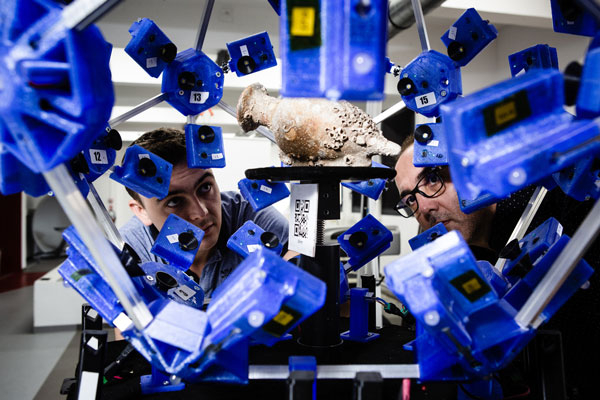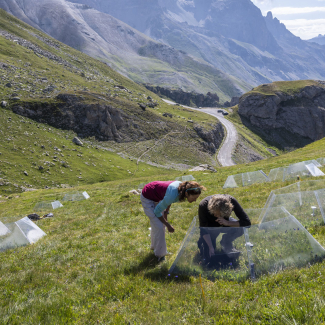
Disciplines
Since it explores all fields of science, research at the CNRS is intrinsically multidisciplinary. With intersecting perspectives, methods and expertise, this interdisciplinary approach enriches each of the different individual disciplines and means the pool of our knowledge can be expanded.
The Institutes of the CNRS
The CNRS Scientific Office (DGDS) is directs the ten Institutes that implement the organisation’s scientific policy. They organise and coordinate the operations of the laboratories.
Find out more about the different fields of research, from biology to the study of Earth and the Universe, through the human and social sciences.
CNRS Biology
Develops and coordinates biological research that aims to unpick the complex nature of living beings, from atoms to biomolecules, from the cell to the whole body and even populations.
CNRS Chemistry
Develops and coordinates research into the formulation of new compounds and understanding chemical reactivity, to continually pursue more precise explanations and predict the relationships between the structures of compounds at the atomic level and their properties.
CNRS Ecology & Environment
Develops and coordinates research in the fields of ecology and the environment, including into biodiversity and the relationship between humans and their environment.
CNRS Engineering
Oversees the continuum between basic research, engineering and technology by focusing on a “systems” approach based on the development of the Institute's core disciplines.
CNRS Mathematics
Develops and coordinates research in the different branches of mathematics, ranging from fundamental concepts to applications. It also contributes to structuring the mathematics community in France and managing its links with the international community.
CNRS Nuclei & Particles
Develops and coordinates research in the fields of nuclear physics, particle physics and astroparticles.
CNRS Physics
Develops and coordinates research in the field of physics with two main driving objectives: the desire to understand the world and the willingness to respond to current challenges in our society.
CNRS Humanities & Social Sciences
Develops research into humans, looking at aspects such as the human capacity to produce language or knowledge, or to interact economically, socially or politically.
CNRS Informatics
Develops research into the fields of computer sciences and digital technology. One of its main objectives is to position these fields, together with the information sciences, at the heart of the multidisciplinary and interdisciplinary challenges by leveraging partnerships with the other CNRS Institutes, and specifically CNRS Engineering.
CNRS Earth & Space
Designs, develops and coordinates research on a national and international scale in astronomy, earth sciences, ocean sciences, atmospheric science and space science.
The laboratories
Scientific discoveries resulting from basic research are made in CNRS laboratories. Researchers, engineers and technicians work together alongside academics and professionals from other institutions (universities, research organisations) and in all disciplines to explore the secrets of life, space and matter, including the study of human societies.
Intrinsically multidisciplinary research
The CNRS is the only research organisation in France that brings together all the scientific disciplines under its auspcices. Basic research pushing boundaries to expand the pool of knowledge is at the heart of the organisation’s mission. The CNRS applies a multidisciplinary approach to grow our understanding of natural and social phenomena, for the benefit of society.
Research enriched by our interdisciplinarity
Interdisciplinarity means research being coordinated across different disciplines. The goal is to foster interactions and exchanges between scientific disciplines that are normally considered to be separate. Science is enlivened by the sharing that results from these encounters. This approach has led to original methods, concepts and solutions emerging. Many major discoveries have been made in this way, at the interface between disciplines and through a meeting of researchers coming from different perspectives.
Interdisciplinarity at the CNRS: the MITI
The aim of the Mission for Transversal and Interdisciplinary Initiatives (MITI) is to promote, drive and coordinate interdisciplinarity at the CNRS, particularly interaction between its ten Institutes. It supports innovative projects led by interdisciplinary communities by providing dedicated tools and funding.
Photo Credit: © Cyril FRESILLON / ARCHAM / CNRS Images


